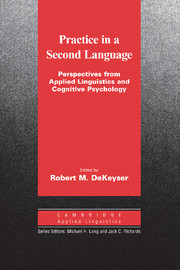Series editors' preface
Published online by Cambridge University Press: 27 January 2010
Summary
Sometimes maligned for its allegedly behaviorist connotations but critical for success in many fields from music and sport to mathematics and language learning, practice is undergoing something of a revival in the applied linguistics literature, and this latest volume in the Cambridge Applied Linguistics Series will undoubtedly heighten interest. To the extent that language is a skill, it behooves us to determine optimal ways of providing opportunities for skill development as well as the optimal timing of those opportunities.
Robert M. DeKeyser's introduction to Practice in a Second Language reminds us, among other things, of progress in this area in cognitive psychology and that the notion of practice lies at the intersection of a number of other issues of fundamental importance in second language learning and teaching. They include relationships between declarative and procedural knowledge/skill, automatization, rule-based and item-based learning, implicit and explicit knowledge, the value and timing of feedback, and the transferability, or not, of potentially skill-specific and task-specific abilities. In other words, the practice issue and theory and research findings on practice are important for a wide variety of theoretical and practical issues in second and foreign language acquisition and teaching.
The book you have before you consists entirely of original contributions authored by some of the leading researchers in the field, assembled and edited by Professor DeKeyser of the University of Maryland. Professor DeKeyser has himself published groundbreaking empirical studies on practice, broadly construed.
- Type
- Chapter
- Information
- Practice in a Second LanguagePerspectives from Applied Linguistics and Cognitive Psychology, pp. xi - xiiPublisher: Cambridge University PressPrint publication year: 2007

